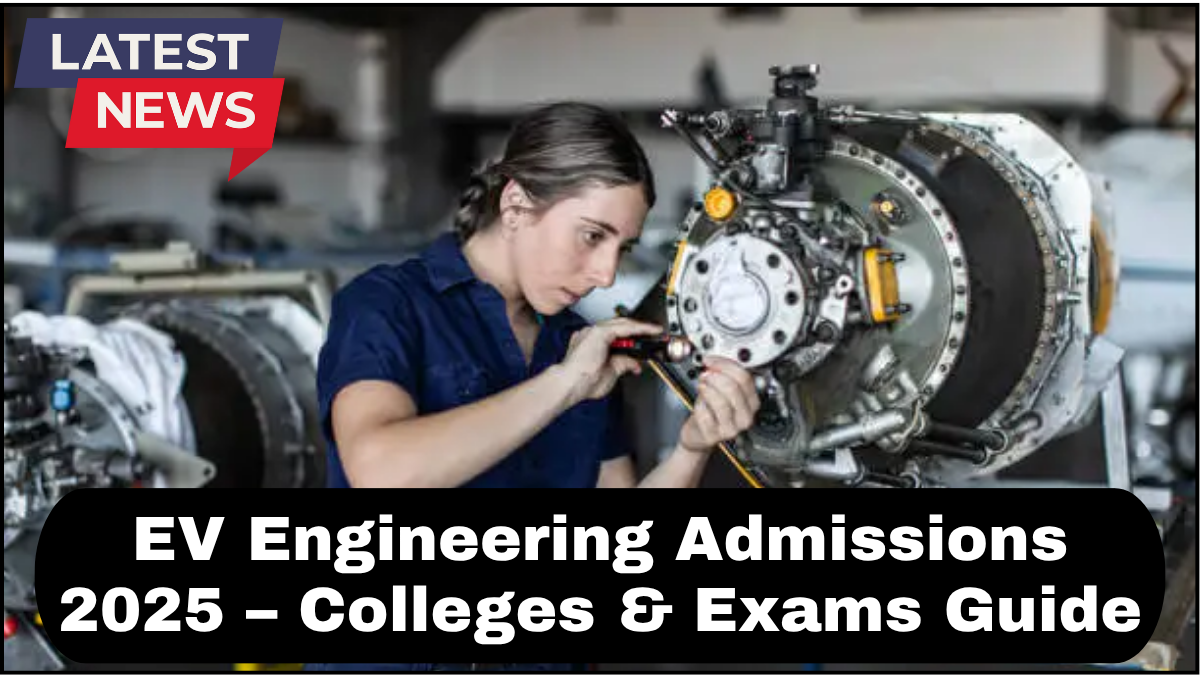The electric vehicle (EV) revolution is rapidly transforming the automotive industry, and with it, the demand for skilled EV engineers is surging. As India gears up for a sustainable mobility future, EV Engineering Admissions 2025 are gaining serious momentum among aspiring engineers. Whether you’re aiming to build cutting-edge battery systems or design high-efficiency drivetrains, now is the time to plan your academic path. Here’s a comprehensive guide to EV engineering colleges in India, entrance exams, eligibility criteria, and everything else you need to know.

What is EV Engineering?
EV (Electric Vehicle) Engineering focuses on the design, development, manufacturing, and maintenance of electric vehicles. It blends mechanical, electrical, and electronics engineering with new-age technologies like battery management systems, embedded systems, and power electronics.
This interdisciplinary field addresses real-world challenges like reducing carbon emissions, improving energy efficiency, and building smarter, connected vehicles. EV Engineering is no longer a niche—it’s a critical domain in both academia and industry.
Scope and Career Opportunities
The career scope in EV engineering is expanding fast. With India targeting 30% electric vehicle penetration by 2030, companies like Tata Motors, Ather Energy, Ola Electric, Mahindra Electric, and MG Motor are investing heavily in EV R&D. Graduates can find roles in:
-
Battery and charging infrastructure design
-
Motor and controller development
-
Powertrain simulation
-
Vehicle software and diagnostics
-
Energy storage systems
-
Smart grid integration
Additionally, government initiatives like the FAME II scheme and PLI incentives for EV manufacturing further boost job prospects.
Top EV Engineering Colleges in India (2025)
Several institutions now offer specialized programs or electives in electric vehicle technology. Here are some of the leading EV engineering colleges in India you should consider for 2025 admissions:
1. IIT Madras (Center for Battery Engineering and Electric Vehicles – C-BEEV)
Offers M.Tech in Electric Vehicles and extensive research options.
2. IIT Delhi
Conducts advanced research in battery systems and electric mobility.
3. VIT Vellore
B.Tech in EEE with Electric Vehicle Technology specialization.
4. SRM Institute of Science and Technology
B.Tech in Electrical and Computer Engineering with a focus on EV systems.
5. Amrita Vishwa Vidyapeetham
Specialized programs in EV design and manufacturing under their automotive engineering branch.
6. UPES Dehradun
Offers B.Tech in Electric Vehicle Technology focusing on real-world projects and internships.
7. Manipal Institute of Technology
Provides electives and research labs tailored to EV engineering.
Admission Process and Entrance Exams
To secure admission in an EV engineering program in 2025, students must follow the standard engineering admission process:
For Undergraduate (B.Tech) Programs
-
JEE Main & Advanced (for IITs, NITs)
-
State-level exams like MHT-CET, KCET, WBJEE, etc.
-
University-specific exams: VITEEE (VIT), SRMJEEE (SRM University), MET (Manipal), and others.
Some private universities offer direct admission based on Class 12 scores and personal interviews, particularly for EV-focused programs.
For Postgraduate (M.Tech/M.E) Programs
-
GATE (Graduate Aptitude Test in Engineering) is mandatory for most IITs and NITs.
-
Some universities also conduct their own entrance tests or accept direct applications.
Make sure to check each college’s official website for the latest admission criteria and application deadlines.
Key Subjects and Curriculum Focus
EV Engineering courses generally cover the following key areas:
-
Electric Drive Systems
-
Battery Technology and Management
-
Power Electronics & Motor Control
-
Embedded Systems for EVs
-
Vehicle Dynamics and Control
-
Renewable Energy Integration
-
Charging Infrastructure and Standards
Practical training through labs, simulation tools (like MATLAB, Simulink), and internships with EV companies form a crucial part of the curriculum.
Scholarships and Financial Aid
Several institutions offer scholarships based on merit, entrance exam performance, or financial need. In addition, government schemes such as AICTE’s Pragati and Saksham scholarships support deserving candidates pursuing engineering in emerging areas like EVs.
Tips for Aspiring EV Engineers
-
Strengthen your base in physics, mathematics, and programming early on.
-
Stay updated on EV trends, new technologies, and government policies.
-
Participate in EV clubs, projects, or competitions like eBAJA, Formula Bharat, or DIY EV conversions.
-
Pursue online certifications on platforms like Coursera or NPTEL in topics like battery technology or EV powertrains.
-
Network with industry professionals via LinkedIn or events like Auto Expo and EV India Summit.
FAQs on EV Engineering Admissions 2025
Q1. Is EV Engineering available as a standalone degree in India?
Yes, some universities now offer dedicated B.Tech or M.Tech programs in Electric Vehicle Engineering, while others offer it as a specialization within EEE or mechanical engineering.
Q2. Can I pursue EV Engineering after a diploma?
Yes, diploma holders in electrical, electronics, or mechanical fields can apply for lateral entry into EV-focused B.Tech programs.
Q3. What entrance exam is required for EV Engineering?
Primarily JEE Main/Advanced, GATE, or specific university-level exams depending on the program and college.
Q4. Is there a high demand for EV engineers in India?
Absolutely. With aggressive EV adoption goals and a booming startup ecosystem, skilled EV engineers are in high demand across R&D, manufacturing, and infrastructure sectors.
Q5. Which is the best EV engineering college in India?
IIT Madras, due to its advanced EV research center and industry collaborations, is among the top choices for EV engineering aspirants.
click here to learn more